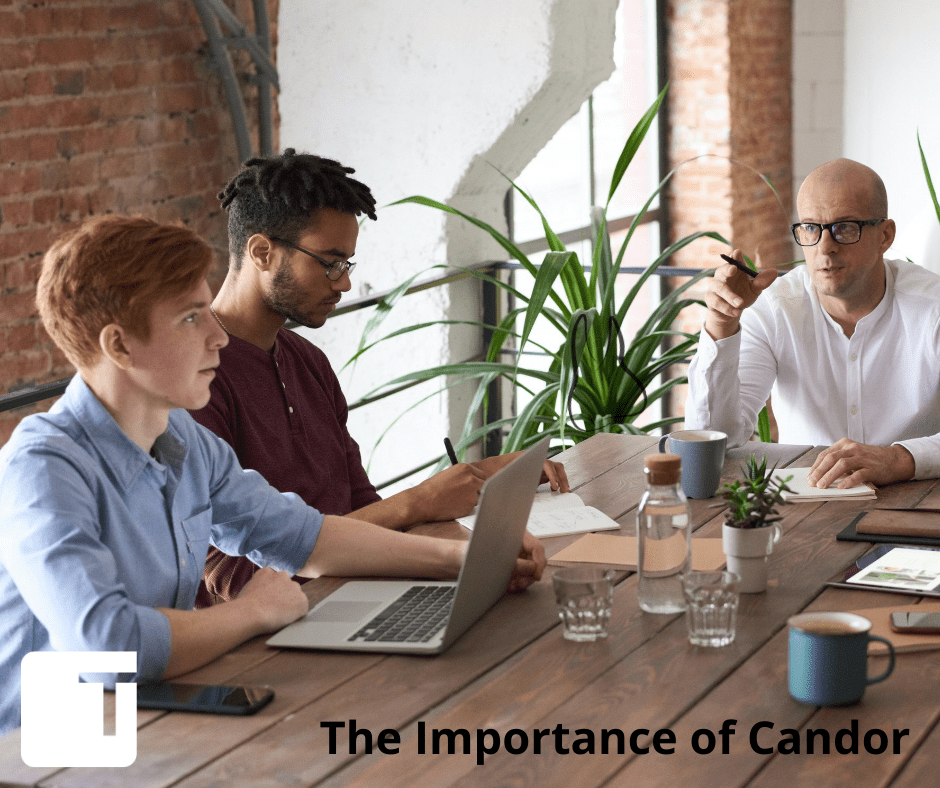Originally published in 2005
Jack Welch, in his national bestseller Winning, makes a big issue about the importance of candor. He calls the lack of candor “the biggest dirty little secret in business.” He is not talking about dishonesty, but the lack of full expression. He is talking about the temptation to not tell the truth if it might offend someone, especially if that someone is your superior. He is talking about people withholding comments and suggestions that might improve the business or the situation. He is especially talking about a lack of candor in performance appraisals.
Candor gets more people involved in the conversation. More perspectives on an issue mean more insight and more intelligent decisions. When you are exploring ways to improve customer service, the more ideas the better. When you need to upgrade your billing and collection department, it seems obvious that the more ideas the richer the changes will be. And when you are seeking to coach people to excellence, honest words of sincere reflection increase the likelihood of positive improvement.
Candor increases the speed in which information is shared and new ideas are put into place. Speed does not automatically result in improvement, but speed and discretion can make a difference in your office. Office politics do not get in the way of office efficiency when every person is encouraged to speak the truth with clarity and sincerity.
Candor cuts costs. When all members of the team are offering their suggestions and offering their insights on a regular basis and being listened to by others, there is less need for meaningless meetings and endless reports that repeat what everyone already knows. Candor can replace PowerPoint slides and boring presentations.
Candor means “frankness and sincerity.” It should not be that difficult to talk to each other, especially when we share the same vision and mission in an organization. On the surface, it would appear that candor would be a natural element of any group of people who are working together. And yet, too often it is missing. Why is that? Why are we afraid to speak honestly and clearly to each other? Perhaps these are questions that do not resonate with your experience, but for those who recognize some truth in this lack of full expression, I offer a few thoughts on why this is happening and a few suggestions about how to address it.
People some-times fear offending others. My father used to say, “If you can’t say something nice about someone, don’t say anything at all.” It worked for him and I love him dearly for it. But sometimes we need to share tough words. If I am committed to a person’s personal and professional growth, my honesty is an imperative. If I have information that will enhance your performance or enable you to open up one of your blind spots, not sharing that information is cheating you. We can find ways to speak the truth in ways that build people up and not tear them down. It is offensive to withhold reflections that can add to my performance. Sometimes people are so brutally honest that they are more brutal than honest. That is not what I am talking about. There is a way to share an observation that can be heard from your heart to another’s.
People sometimes lack confidence. “This is just my opinion” or “I have only been part of this team for a few months” are words that stifle creativity. Often the new employee or the soft-spoken long-time employee has words of wisdom that could transform the business. Don’t allow tenure or organizational structure to block insightful suggestions. Maybe we need a few children who will announce, “the king has no clothes on” at times. Encourage and reward suggestions that are adopted. Encourage even suggestions that are not put into practice. All employees want to be listened to and deserve to be heard when they come up with new creative suggestions.
Sometimes candor is not encouraged. An unwritten guideline in too many offices or organizations states, “only the upper-level people possess the wisdom to run this show.” Promoting interaction between all levels in the office is an important part of organizational development. It is not the expert consultant from outside who has the truth of your future. It is the committed and empowered employee who holds that secret. Synergy happens in the open sharing of insights, reflections, wild new ideas, and personal ponderings.
Each one of us is doing something all the time that often goes unnoticed. We are constantly thinking, feeling, and wanting. The dialogue that goes on between our frontal cortex brain and our limbic brain offers a clue to returning candor to the workplace. By paying more attention to that inner conversation, we can radically improve our outer conversations.
I will be more specific. When observing an employee’s behavior, I may be thinking he is failing to meet my expectations. Those thoughts are refined in my reflection and I begin to recognize carefully worded adjustments that I can offer. I have feelings. I am sad for I have talked to this person before about this. I am a bit frustrated that the necessary action has not been taken. I know that we need better performance in order to accomplish our mission. I want that person to change a particular behavior. So I speak the truth as I see it. He, the employee, is also thinking, feeling, and wanting all the time. I listen fully and even coach employees to share their thoughts, feelings, and intentions. The conversation creates new insight for both of us.
Not all thoughts need to be expressed. Certainly, some feelings are for my brain only. But paying attention to my thoughts and feelings is very important if I am going to be emotionally intelligent. The return of candor can only happen when each of us uses good discretion in choosing how to speak the truth in love. As an appreciative inquiry coach, I am committed to “making the other person right and telling the truth.” There is a way to communicate even tough messages to my clients. Candor can be a big step in building a great office and an exceptional business.
Dr. David Nelson is an “Appreciative Inquiry” coach.
FMI: David Nelson (typepad.com)
Read more from David:

